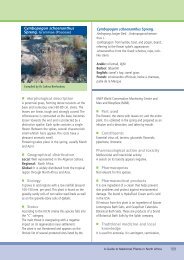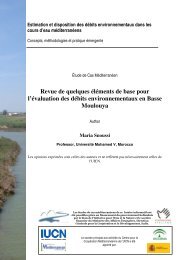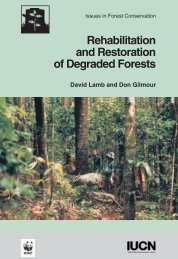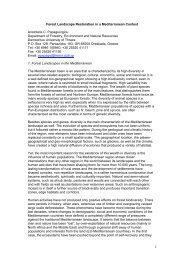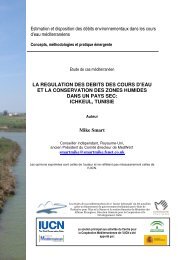The Protected Landscape Approach - Centre for Mediterranean ...
The Protected Landscape Approach - Centre for Mediterranean ...
The Protected Landscape Approach - Centre for Mediterranean ...
Create successful ePaper yourself
Turn your PDF publications into a flip-book with our unique Google optimized e-Paper software.
<strong>The</strong> <strong>Protected</strong> <strong>Landscape</strong> <strong>Approach</strong>: Linking Nature, Culture and Community<br />
Building local support<br />
In the UK, as in many other countries, it is recognised that protected areas will not survive, nor<br />
achieve their aims, without local support. Since many people live in the Category V protected<br />
areas and often play an important part in the management and protection of their natural and<br />
cultural resources, such support is all the more necessary.<br />
This means that local communities should feel that they are consulted and listened to, and<br />
have their concerns addressed. <strong>Protected</strong> <strong>Landscape</strong>s should be seen to bring social and<br />
economic benefits, or at least not unfairly disadvantage local people. <strong>The</strong>re is much debate in<br />
many Category V protected areas about how to provide jobs, incomes and af<strong>for</strong>dable housing<br />
in ways that are sustainable and support the protection, enhancement and enjoyment of the<br />
<strong>Protected</strong> <strong>Landscape</strong>. For example, one challenge is providing af<strong>for</strong>dable housing <strong>for</strong> local<br />
people, and doing this to high design standards that complement the landscape. Many <strong>Protected</strong><br />
<strong>Landscape</strong>s have pioneered schemes of this kind, frequently working in partnership with other<br />
bodies. Moreover, the quality of the natural environment is a key economic advantage: one in<br />
six Welsh jobs, <strong>for</strong> example, depend directly on it. Even so, some people still feel that the<br />
conservation policies of Category V protected areas can inhibit economic and social prospects,<br />
especially through restrictions imposed by land use planning.<br />
Of course, there have to be constraints, in particular to exclude large-scale economic<br />
investment that would be out of scale with the landscape: quarrying, large infrastructure<br />
projects and mass tourism, <strong>for</strong> example, and to check cumulative trends that erode the<br />
landscape (such as poor design). On the other hand, it is widely believed that Category V<br />
protected areas can support – indeed should attract – appropriately scaled, environmentally<br />
sustainable development.<br />
Governance is an important aspect of community involvement. As noted above, in most<br />
cases the local democratic interest is secured by the nomination of local authority members to<br />
the authorities that run the area. However these arrangements may still leave a “democratic<br />
deficit”. <strong>The</strong> arrangement under which a fifth of the members of the new Scottish National<br />
Parks will be directly elected is significant there<strong>for</strong>e.<br />
<strong>The</strong>re are also less <strong>for</strong>mal ways of involving local communities, e.g., through community<br />
<strong>for</strong>a, and all the <strong>Protected</strong> <strong>Landscape</strong>s authorities are required to consult widely over their<br />
plans. <strong>The</strong> governance of <strong>Protected</strong> <strong>Landscape</strong>s is likely to remain a continuing source of<br />
debate and innovation.<br />
Benefits <strong>for</strong> society<br />
<strong>The</strong> early history of National Parks in England and Wales, and of Regional Parks in Scotland,<br />
was largely driven by the need to provide urban populations with recreational space and beauty<br />
to offset the drudgery of industrial life. While the advent of cheap international tourism and<br />
other social developments complicate this argument, it is as important as ever to protect<br />
relatively wild places and unspoilt countryside, and make it accessible <strong>for</strong> public use. Some 100<br />
million visits are paid each year to UK National Parks. However, realizing their full potential<br />
<strong>for</strong> recreation and mental and physical well-being depends on greater social inclusion.<br />
128




